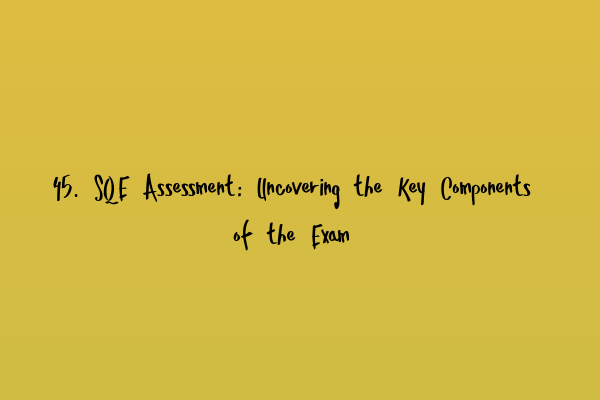45. SQE Assessment: Uncovering the Key Components of the Exam
The Solicitors Qualifying Examination (SQE) is a crucial step towards becoming a qualified solicitor in England and Wales. This comprehensive exam assesses your knowledge, skills, and abilities across various areas of law. In this blog post, we will delve into the key components of the SQE assessment and provide valuable insights to help you prepare effectively.
1. SQE1: Assessing Legal Knowledge
The first part of the SQE assessment is SQE1, which evaluates your foundation legal knowledge. This section consists of multiple-choice questions (MCQs) and focuses on areas such as contract law, criminal law, property law, and tort law. To succeed in SQE1, it is vital to have a strong understanding of the core legal principles and their application.
If you want to conquer the MCQs in SQE1, make sure to check out our related article on Mastering Time Management in SQE: Strategies for Efficient Exam Completion.
2. SQE2: Testing Practical Legal Skills
The second part of the SQE assessment is SQE2, which focuses on assessing your practical legal skills. This section consists of a combination of written tasks and oral exercises designed to evaluate your ability to apply legal knowledge to real-life scenarios. SQE2 will require you to analyze case studies, draft legal documents, and demonstrate your advocacy skills.
If you want to understand how to apply your legal knowledge in real-life scenarios, we recommend reading our article on SQE Case Studies: Applying Knowledge in Real-Life Scenarios.
3. Professional Ethics and Legal Research
In addition to testing your legal knowledge and practical skills, the SQE assessment also includes components on professional ethics and legal research. These areas are essential for every solicitor as they form the foundation of ethical practice and effective legal representation.
3.1 Professional Ethics
Professional ethics play a crucial role in the legal profession. The SQE assessment will evaluate your understanding of the Solicitors Regulation Authority (SRA) Code of Conduct and your ability to apply ethical principles to various scenarios. It is important to familiarize yourself with the code and practice applying ethical reasoning in different contexts.
3.2 Legal Research
Legal research is an integral part of legal practice. The SQE assessment will test your ability to find relevant legal sources, analyze case law, and apply legal research techniques to solve complex legal problems. Developing strong research skills and understanding how to navigate legal databases will be invaluable in this component of the exam.
4. Preparing for the SQE Assessment
As the SQE assessment is comprehensive and demanding, it is essential to be well-prepared. Here are some key steps to help you in your preparation:
4.1 Analyzing Mock Results
One effective way to identify areas of improvement is by analyzing your mock exam results. By understanding your strengths and weaknesses, you can tailor your study plan to focus on the areas that require more attention. For a comprehensive guide on analyzing your mock results, check out our article on Analyzing Mock Results for SQE: Identifying Areas of Improvement.
4.2 Mastering Time Management
Time management is crucial in the SQE assessment, particularly in SQE1 where you will face a large number of MCQs. Developing effective time management strategies will ensure that you can allocate sufficient time to each question. Learn more about mastering time management in our related article on Mastering Time Management in SQE: Strategies for Efficient Exam Completion.
4.3 Revision Techniques
Effective revision techniques are key to SQE success. Develop a structured revision plan that includes active learning methods such as reviewing past exam questions, creating summary notes, and engaging in group study sessions. For more tips on mastering effective revision techniques, check out our article on Mastering Effective Revision Techniques for SQE Success.
In conclusion, the SQE assessment is a critical milestone on the path to becoming a qualified solicitor. Understanding the key components, such as SQE1, SQE2, professional ethics, and legal research, will help you focus your efforts in your preparation. By implementing effective study strategies, analyzing mock results, and developing a solid understanding of the exam requirements, you can increase your chances of success in the SQE assessment.
